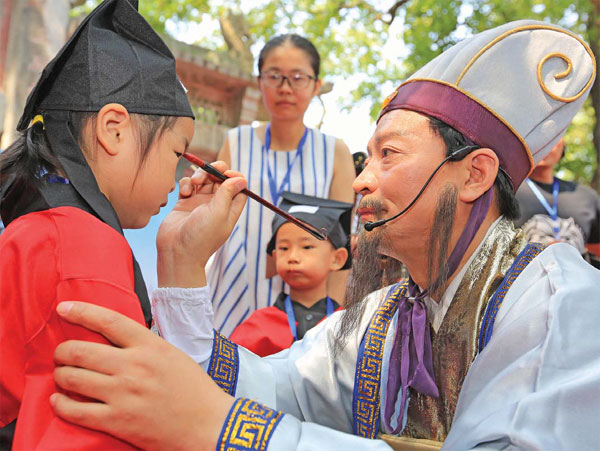Man of influence

How a brilliant statesman lent his name to a variety of popular proverbs
If you ask a Chinese person who was the most intelligent person in China, the answer is likely to be Zhuge Liang, prime minister of the state of Shu during the Three Kingdoms period (220-280). The achievements of this statesman, strategist, and scholar have made the name Zhuge Liang - even just the surname Zhuge - synonymous with intelligence in Chinese culture. When people praise someone for being smart, they often just say, "that's our Zhuge".
The wisdom of Zhuge Liang was popularized by the historical novel Romance of the Three Kingdoms, one of China's four great classical novels, written by Luo Guanzhong of the Ming Dynasty (1368-1644). In it, Zhuge Liang is attributed with fantastic (if not strictly intellectual) achievements such as summoning advantageous winds in battle.
| A man dressed as Zhuge Liang draws a sindoor on a child's forehead in a traditional activity in Xiangyang, Hubei province. Provided to China Daily |
Many stories about Zhuge Liang, not all confirmed by history, have been passed down through the generations, and some have evolved into popular sayings that people use in daily life.
Here are a few:
三个臭皮匠,顶个诸葛亮
Three cobblers are equal to one Zhuge Liang.
Similar to the expression "Two heads are better than one," this proverb says that if three cobblers work together, they can be as smart as Zhuge Liang.
But how did a cobbler become a unit of intelligence? Actually, the original saying was that "Three vice-generals are equal to one Zhuge Liang". Because "vice-generals" (裨将, píjiàng) has the same pronunciation as "cobbler" (皮匠, píjiàng), the saying has become mangled over time.
You can use this phrase if you want to start a brainstorming session with a group of people, but be careful - you have to humbly include yourself among the cobblers, or it sounds like you're insulting the others' intelligence.
Example:
咱们一定能想出办法的!三个臭皮匠,顶个诸葛亮!
Zánmen yídìng néng xiǎng chū bànfa de! Sān gè chòu píjiàng, dǐng gè Zhūgě Liàng.
We can certainly figure out a way. Three cobblers are equal to one Zhuge Liang!
事后诸葛亮
Zhuge Liang after the fact.
Though Chinese people love Zhuge Liang, not every idiom with his name in it has a positive meaning. "Zhuge Liang after the event" is the Chinese version of the "Monday-morning quarterback".
In every culture, people create terms to refer to those who always say how they would have done something better or differently in hindsight. So, if someone comes to you with some blindingly obvious advice after the fact, you can just call them "事后诸葛亮(shìhòu Zhūgě Liàng)".
既生瑜,何生亮
Since (Zhou) Yu was born, why did (Zhuge) Liang have to be born too?
These were the last words of the famed military general and strategist Zhou Yu in Romance of the Three Kingdoms (just in the novel, not in actual history). Zhou Yu, who worked for the kingdom of Wu, was a rival of Zhuge Liang. Zhou kept trying to outwit Zhuge but never succeeded.
After a lifetime of having his military plans foiled by Zhuge, finally, after a serious defeat, Zhou became so agitated that it caused one of his arrow wounds to reopen, leading to his death.
Before he died, Zhou lamented the cruel cosmic joke that caused his great rival to be born in the same era as himself. Due to the popularity of the novel, almost every individual in China knows this proverb, and it is used to comment on someone who keeps losing to the same opponent.
Imagine, for example, Lex Luthor lamenting that Superman didn't arrive a lifetime later and you get the drift.
Example:
A: 这是李雷的第五个亚军了,他真的赢不了韩梅梅。
This is the fifth time that Li Lei's become the runner-up. He just can't beat Han Meimei.
Zhè shì Lǐ Léi de dì wǔ gè yàjūn le, tā zhēnde yíng bù liǎo Hán Méiméi.
B: 是啊,既生瑜何生亮啊。
Shì a, jì shēng yú, hé shēng liàng.
Yeah, Since (Zhou) Yu was born, why did (Zhuge) Liang have to be born too?
一时瑜亮
Zhou Yu and Zhuge Liang of the same era
A similar idiom involving Zhou Yu and Zhuge Liang is "一时瑜亮 (Zhou Yu and Zhuge Liang of the same time)", but it refers to "two equally outstanding contemporaries". In this case, it doesn't emphasize who is better between Zhou Yu and Zhuge Liang, but just focuses on how well-matched their talents are.
Example:
For the past 10 years, (athletic rivals) Lin Dan and Lee Chong Wei have been the "Zhou Yu and Zhuge Liang of the same era" in the badminton world.
Zài guòqù shí nián lǐ, Lín Dān hé Lǐ Zōngwéi zài yǔmáoqiú jiè kānchēng yì shí yú liàng.
在过去十年里,林丹和李宗伟在羽毛球界堪称一时瑜亮。
诸葛亮吊孝
Zhuge Liang mourns for Zhou Yu
Zhou Yu couldn't dissociate himself from Zhuge Liang even after he died. In the Three Kingdoms, after Zhou's death (caused by Zhuge Liang himself), Zhuge went to his funeral ceremony and cried.
The story stopped there, but wagging tongues did not. In later history, some people believed that Zhuge felt sad because he lost a great rival, while others thought he was there to mock Zhou Yu one last time.
So "Zhuge Liang mourns for Zhou Yu" means expressing sadness that is not sincere, like "shedding crocodile tears".
Example:
别被他的故作姿态骗了,他这是诸葛亮吊孝而已。
Bié bèi tā de gùzuò zītài piàn le, tā zhè shì Zhūgě Liàng diàoxiào éryǐ.
Don't be fooled by his actions. It's just "Zhuge Liang mourning Zhou Yu."
诸葛亮斩马谡
Zhuge Liang executes Ma Su
Ma Su was one of Zhuge's favorite subordinates. They had a very close bond and Zhuge treated him as a student. But in the Romance of Three Kingdoms, Zhuge had to execute Ma because Ma made some serious mistakes in an important battle, which led to a severe defeat.
Since Ma had signed a military pledge (an army officer's agreement with his superior, accepting severely punished if he can not successfully carry out a mission for which he has volunteered), Zhuge had no choice but to kill him according to their agreement.
After a considerable inner struggle, Zhuge finally gave the order in tears. Thus, "Zhuge Liang executes Ma Su" became an idiom, meaning that someone must impartially treat those they are close to (usually in a punitive way) for the greater good.
Example:
A: He fired his brother-in-law? His wife will be very upset!
Tā kāichú le tā xiǎojiùzi? Ta lǎopo yídìng huì fābiāo de!
他开除了他小舅子?他老婆一定会发飙的!
B: Zhuge Liang executes Ma Su - as a boss, that's something you have to do.
Zhūgě Liàng zhǎn Mǎ Sù bei - shēnwéi lǎobǎn, nǐ bìxū děi zhème zuò!
诸葛亮斩马谡呗 - 身为老板,你必须得这么做!
Courtesy of The World of Chinese, www.theworldofchinese.com
The World of Chinese
(China Daily Africa Weekly 10/07/2016 page23)
Today's Top News
- China reports 5% GDP growth in 2025
- Return capsule of Shenzhou XX safely returns to Earth
- Sanya rises as magnet for Russian tourists
- China's steady opening-up for Asia-Pacific economic growth
- Blueprint seen as a boon for entire world
- 'Kill line' an inevitable outcome of US system






























